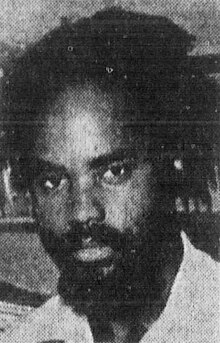
Back موميا أبو جمال Arabic موميا ابو جمال ARZ مومیا ابو جمال AZB Mumia Abu-Jamal Catalan Mumia Abu-Jamal Danish Mumia Abu-Jamal German Mumia Abu Jamal Esperanto Mumia Abu-Jamal Spanish Mumia Abu-Jamal Basque مومیا ابو جمال Persian
Mumia Abu-Jamal | |
|---|---|
 Abu-Jamal c. 1980 | |
| Born | Wesley Cook April 24, 1954 Philadelphia, Pennsylvania, U.S. |
| Occupation(s) | Activist, journalist |
| Criminal status | Incarcerated |
| Spouses | |
| Children | 8[3] |
| Conviction(s) | First degree murder |
| Criminal penalty | Death; commuted to life imprisonment without parole |
Mumia Abu-Jamal (born Wesley Cook;[3] April 24, 1954) is an American political activist and journalist who was convicted of murder and sentenced to death in 1982 for the 1981 murder of Philadelphia police officer Daniel Faulkner. While on death row, he has written and commented on the criminal justice system in the United States. After numerous appeals, his death penalty sentence was overturned by a federal court. In 2011, the prosecution agreed to a sentence of life imprisonment without parole. He entered the general prison population early the following year.
Beginning at the age of 14 in 1968, Abu-Jamal became involved with the Black Panther Party and was a member until October 1970, leaving the party at age 16. After leaving, he completed his high school education, and later became a radio reporter. He eventually served as president of the Philadelphia Association of Black Journalists (1978–1980). He supported MOVE, a Philadelphia-based organization, and covered the 1978 confrontation in which one police officer was killed. The MOVE Nine were the members who were arrested and convicted of murder in that case.
Since 1982, the murder trial of Abu-Jamal has been seriously criticized for constitutional failings;[4] some have claimed that he is innocent, and many opposed his death sentence.[5][6] The Faulkner family, politicians,[7] and other groups involved with law enforcement, state and city governments[8] argue that Abu-Jamal's trial was fair, his guilt beyond question, and his death sentence justified.
When his death sentence was overturned by a federal court in 2001, he was described as "perhaps the world's best-known death-row inmate" by The New York Times.[9] During his imprisonment, Abu-Jamal has published books and commentaries on social and political issues; his first book was Live from Death Row (1995).
- ^ a b c Gay, Kathlyn (September 2, 2018). American Dissidents: An Encyclopedia of Activists, Subversives, and Prisoners of Conscience. ABC-CLIO. ISBN 9781598847642 – via Google Books.
- ^ "Please Like and Share our Page!
The Malcolm X Commemoration Committee is stunned and brokenhearted to learn of the sudden passing of our sister and comrade Wadiyah Jamal, the wife of our beloved Mumia Abu Jamal. We will be in attendance of her Janazah tomorrow.
May we encircle Mumia with a ring of love, healing, comfort and support!". Facebook. Malcolm X Commemoration Committee. December 29, 2022.[better source needed] - ^ a b Smith, Laura (October 25, 2007). "I spend my days preparing for life, not for death". The Guardian. London. Retrieved February 15, 2018.
- ^ "A Life in the Balance: The Case of Mumia Abu-Jamal". Amnesty International. February 17, 2000. Archived from the original on December 1, 2008. Retrieved October 18, 2007.
- ^ Taylor, Stuart Jr. (December 1, 1995). "Guilty and Framed". The American Lawyer. Archived from the original on August 8, 2014. Retrieved July 31, 2014.
- ^ "European Parliament resolution 9(f) B4-1170/95 (p. 39 of original, 49 of pdf)". European Parliament. September 21, 1995. Archived from the original (PDF) on October 13, 2007. Retrieved January 22, 2008.
- ^ Cite error: The named reference
politicspa.comwas invoked but never defined (see the help page). - ^ Cite error: The named reference
humanitewas invoked but never defined (see the help page). - ^ Rimer, Sara (December 19, 2001). "Death Sentence Overturned in 1981 Killing of Officer". The New York Times. p. 1. Retrieved July 6, 2011.
© MMXXIII Rich X Search. We shall prevail. All rights reserved. Rich X Search